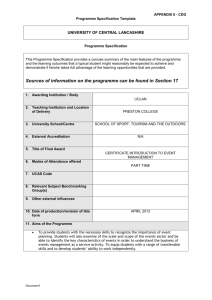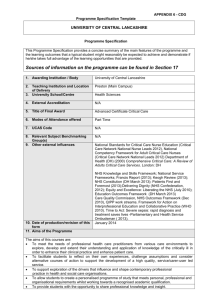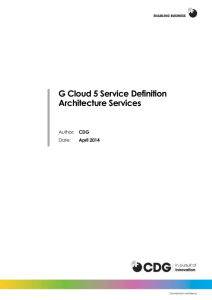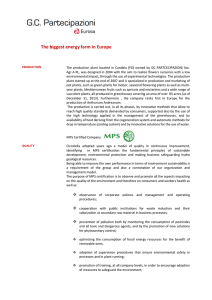Constituency Development Grant Tashi Wangmo & Karma Y Raydi
advertisement
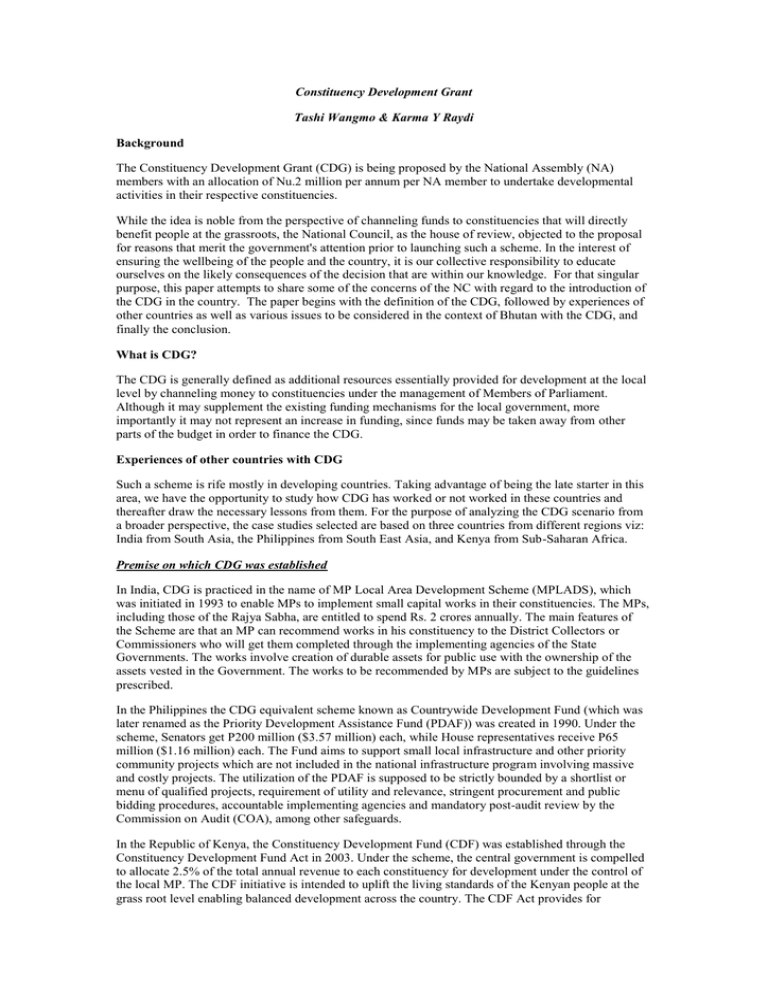
Constituency Development Grant Tashi Wangmo & Karma Y Raydi Background The Constituency Development Grant (CDG) is being proposed by the National Assembly (NA) members with an allocation of Nu.2 million per annum per NA member to undertake developmental activities in their respective constituencies. While the idea is noble from the perspective of channeling funds to constituencies that will directly benefit people at the grassroots, the National Council, as the house of review, objected to the proposal for reasons that merit the government's attention prior to launching such a scheme. In the interest of ensuring the wellbeing of the people and the country, it is our collective responsibility to educate ourselves on the likely consequences of the decision that are within our knowledge. For that singular purpose, this paper attempts to share some of the concerns of the NC with regard to the introduction of the CDG in the country. The paper begins with the definition of the CDG, followed by experiences of other countries as well as various issues to be considered in the context of Bhutan with the CDG, and finally the conclusion. What is CDG? The CDG is generally defined as additional resources essentially provided for development at the local level by channeling money to constituencies under the management of Members of Parliament. Although it may supplement the existing funding mechanisms for the local government, more importantly it may not represent an increase in funding, since funds may be taken away from other parts of the budget in order to finance the CDG. Experiences of other countries with CDG Such a scheme is rife mostly in developing countries. Taking advantage of being the late starter in this area, we have the opportunity to study how CDG has worked or not worked in these countries and thereafter draw the necessary lessons from them. For the purpose of analyzing the CDG scenario from a broader perspective, the case studies selected are based on three countries from different regions viz: India from South Asia, the Philippines from South East Asia, and Kenya from Sub-Saharan Africa. Premise on which CDG was established In India, CDG is practiced in the name of MP Local Area Development Scheme (MPLADS), which was initiated in 1993 to enable MPs to implement small capital works in their constituencies. The MPs, including those of the Rajya Sabha, are entitled to spend Rs. 2 crores annually. The main features of the Scheme are that an MP can recommend works in his constituency to the District Collectors or Commissioners who will get them completed through the implementing agencies of the State Governments. The works involve creation of durable assets for public use with the ownership of the assets vested in the Government. The works to be recommended by MPs are subject to the guidelines prescribed. In the Philippines the CDG equivalent scheme known as Countrywide Development Fund (which was later renamed as the Priority Development Assistance Fund (PDAF)) was created in 1990. Under the scheme, Senators get P200 million ($3.57 million) each, while House representatives receive P65 million ($1.16 million) each. The Fund aims to support small local infrastructure and other priority community projects which are not included in the national infrastructure program involving massive and costly projects. The utilization of the PDAF is supposed to be strictly bounded by a shortlist or menu of qualified projects, requirement of utility and relevance, stringent procurement and public bidding procedures, accountable implementing agencies and mandatory post-audit review by the Commission on Audit (COA), among other safeguards. In the Republic of Kenya, the Constituency Development Fund (CDF) was established through the Constituency Development Fund Act in 2003. Under the scheme, the central government is compelled to allocate 2.5% of the total annual revenue to each constituency for development under the control of the local MP. The CDF initiative is intended to uplift the living standards of the Kenyan people at the grass root level enabling balanced development across the country. The CDF Act provides for management structures to be put in place to oversee the implementation of CDF projects and more importantly to ensure prudent utilization of the funds. These structures include the Constituencies Development Fund Committee, National Management Committee (NMC), District Projects Committee, and the Constituencies Development Committee (CDC). What has happened in reality? As can be inferred from the above paragraphs, the common motive behind the establishment of the CDG by all three countries was to genuinely facilitate developmental activities at the grass root level by channeling funds directly to the constituencies. The seriousness of the intention is evidenced by the fact that all three countries had put in place comprehensive mechanism to ensure judicious utilization of the funds. However, in reality the scheme fell far short of achieving its noble objective and instead became a topic of controversial debate in all these countries. Summarized reports on such ill effects are presented in the following paragraphs. Ever since its conception, the MPLADS in India has been constantly criticized on the grounds of erosion of separation of powers between the executive and the legislative (as provided for in the Constitution of India), dilution of the powers of the Panchayats (local governments), and mismanagement and misuse of funds. The criticism has come from bodies such as the Second Administrative Review Commission (ARC) of the Ministry of Personnel, Public Grievances and Pensions, the Evaluation Team of the Planning Commission, the Comptroller and Auditor General of India, and the Indian Institute of Public Administration and from noted figures such as the current Lok Sabha Speaker Somnath Chatterjee and Justice E.S. Venkataramiah, former Chief Justice of India who called the scheme an "assault on the Constitution". Even leaders of political parties from Dr. Manmohan Singh to L K Advani have suggested the scrapping of the scheme. In order to monitor the implementation of the National Common Minimum Programme of the United Progressive Alliance (UPA) government, it set up, in June 2004, the National Advisory Council (NAC) with Congress leader Sonia Gandhi as chairperson. The NAC recommended discontinuance of MPLADS, stating, "Ideally, local area development needs should be determined and interventions made by the elected local governments. Therefore, MPLADS should be dispensed with, and these funds should directly go to panchayats and municipalities for the same purposes..." In the Philippines, the fund is alternatively known as the "pork barrel" fund. Pork barrel (or pork barrel politics) is a derogatory term used to describe government spending that is intended to enrich constituents of a politician in return for campaign contributions or votes. The attacks on the pork have come from many quarters. Civil society organizations and many columnists have called for its outright abolition, arguing that Congress' job is to legislate and not execute or implement projects. Bureaucrats assert that legislators should not mangle the executive budget they produced through rational and consultative processes. Other critics question the choice of projects identified by legislators as piecemeal and irrational. Still others have called for the transfer of pork barrel funds directly to local governments. In the latest attack on the pork barrel, the Philippine Center for Investigative Journalism (PCIJ) argues that while pork barrel funds do provide services to constituents, they foster political patronage, institutionalize patron-client relations, strengthen the chances of incumbents for re-election, and engender corruption. Similarly in the Republic of Kenya, there have been problems in terms of the operation, management and distribution of the Fund. The Fund provided avenue for the MPs to indulge in corruption, and misuse of Funds/Ghost projects. There were instances where some members were accused of funding projects in areas where they have massive support and are likely to get substantial votes at the expense of equitable distribution; some are also accused of amassing wealth and campaign money through ghost projects allegedy funded then latter diverted to enrich their pockets within the knowledge of a few confidantes. A report on devolved fund assessment prepared by Centre for Governance and Development states that "Funds poor management in some constituencies, however, has resulted in misused of resources, lack of transparency and accountability and general disillusionment. As a result there has been lack of confidence coupled with minimal community participation in the fund's overall development process and activities". In the same report, it indicates that majority of the respondents interviewed pointed out that the fund is highly politicized with information flowing mainly to persons or individual with patronage linkages to the MP. Of course, these accounts do not undermine the fact that the scheme has worked to some extent in the case of Kenya. This is however, attributive to the unique structure of governance which is highly centralized; and in the absence of an institution such as local government, CDF in Kenya has provided an important channel for funds to flow to the constituencies. Furthermore, the scheme has helped ensuring the government to allocate certain portion of fund for developmental activities at the grassroots. Issues to be considered in our context CDG undermines parliamentary oversight role: The role of the MPs is clearly spelled out in Article 10.2 of the Constitution of the Kingdom of Bhutan that states, "Parliament shall ensure that the Government safeguards the interests of the nation and fulfill the aspirations of the people through public review of policies and issues, Bills and other legislation, and scrutiny of State functions". Further to it, Article 20.5 stipulates that planning and coordinating government policies and ensuring their implementation is a function of the Executive that is headed by the Lhengye Zhungtshog and supported by the civil administration. As an example, with respect to the mandate on scrutiny of State function, the Public Accounts Committee (PAC) has been established with membership composed of MPs to review and scrutinize utilization of public funds by executive and judiciary branches of the government. If MPs are engaged in implementing public funds themselves, the efficacy and integrity of the PAC would be grossly undermined. In addition, it is in direct contravention of Article 1.13 of the Constitution which emphasizes on the separation of the Executive, the Legislature and the Judiciary, with no encroachment of each others' powers permissible. Risk of undermining policy of decentralization: Article 22.1 of the Constitution states that, "Power and authority shall be decentralized and devolved to elected Local Governments (LGs) to facilitate the direct participation of the people in the development and management of their own social, economic and environmental well-being". Article 22.4 states that provisioning of democratic and accountable government, and ensuring the provision of services to local communities are the functions of Local Governments. According to these two Articles, the CDG related activities automatically fall under the purview of the local governments rather than that of Parliamentarians. Just like the MPLADS in India has diluted the powers of panchayats, failing to recognize and respect the separate roles laid down in the Constitution for the respective institutions will only sabotage the policy of decentralization. Therefore, the CDF proposal is not only in direct contravention to the spirit of decentralization espoused in Article 22 of the Constitution. Free and Fair Elections The CDG proposal also flouts the spirit of the Constitution that provides for the elections to Parliament and Local Governments to be "free and fair" as espoused in Article 24.1. In order for elections to be free and fair, the Constitution institutes a public campaign fund in Article 16 that provides for state financing of elections to Parliament. This is to ensure that politics does not become an exclusive reserve for the wealthy through the influence of money power to win elections, as tends to happen in many countries, both developed and developing. The provision of state financing for elections and the fixing of an expenditure ceiling for political parties ensures that political parties and their candidates do not use funds in excess of the ceiling to buy votes. Since wealthy candidates and parties are not permitted to use their private funds in excess of the ceiling, this creates a level playing field for all political parties and candidates and controls the influence of money power over election results. Therefore, when the Constitution does not allow even the use of private funds for any electoral advantage, the CDG proposal goes against the principle of "free and fair" elections as public funds will be used to bring development activities by individual MP's to their constituencies which will give an unjust electoral advantage to sitting MPs. It comes from the same kitty: Based on current planning procedure, various Gewogs and Dzongkhags prepare a list of activities that they would like to implement within their localities based on the broad guidelines and priorities established by the government. Similarly, the central agencies also prepare their list of activities which are all submitted to the GNH Commission. The GNH Commission, based on the resources available within a plan period and the priorities identified by the government, allocates resources to the various sectors and local governments. During this process of resource allocation, the size of the plan gets reduced due to financial resource constraints. For example, if a Geog has requested for Nu. 50 million as its requirement for the 10th Plan, it may be reduced to Nu. 40 million since the government has a fixed resource ceiling for the whole Plan and is able to afford only this amount for that Geog. This process of budget reduction occurs across the board for local governments as well as central agencies for the sole reason of insufficiency of financial resources. Therefore, when the government creates a CDG of Nu. 2 million per MP which works out to Nu. 470 million for the 10 th Plan (Nu. 2 M x 47 MPs x 5 yrs), it only means that the extent of reduction from the 10th Plan for local governments is Nu. 470 million, over and above the reductions that have already taken place without the CDG. Following from the above example, the Geog's allocation will further decrease to Nu. 30/35 million since the Nu. 470 million CDG has to be drawn from the kitty for local governments. Both the reduction of funds for the local governments and the granting of CDG to the MPs are done by the same government from the same kitty, so in effect, at the end of the Plan, the LGs will have access to the same amount of funds. The only difference is that the LGs authority of deciding which projects to implement will reduce to the extent of Nu. 470 million. Problem is more with HR capacity for implementation: The civil service administration that executes the projects in the Dzongkhags and Geogs is severely constrained in terms of executing capacity due to the shortage of engineers, accountants, planners, etc. This problem will be further aggravated in the 10th Plan as the size of the Plan is twice that of the 9th Plan while civil service strength has not been increased proportionately. This will lead to problems with the Dzongkhag and Geog administrations on which projects to prioritize - ones identified by the MP or the ones by the LGs. This can lead to conflicts between the MP, the LGs and the Dzongdags. Is equity being addressed?: The equitable distribution of resources will be brought to question since a uniform amount of Nu. 2 million is proposed for all MPs whereas the needs may be different for different constituencies. Misuse of CDG resources may be a risk: Experiences in three countries have shown that despite having stringent guidelines for utilization of the fund, it is vulnerable to misappropriation and mismanagement by the MPs. While unlikely in our scenario, the possibility of such things happening cannot be ruled out. Conclusion Experiences from the three countries studied have indicated that as opposed to its noble intention, the CDG scheme has failed in many ways. More importantly, the concept of CDG in relation to Bhutanese context poses a question on its constitutionality. Our country has enjoyed the kind of socio-economic development within a short span of 30-40 years that takes much longer in other countries due undoubtedly to the visionary and enlightened leadership demonstrated by our Kings. The other major factor has also been the lessons we have been able to draw from the experiences of other countries due to our late entry into the modern socio-economic development process. We have enjoyed the luxury of choosing from the best ideas adopted elsewhere while discarding those that have failed. Therefore, we must learn from the failure of the CDG scheme in the above cited countries. The leaderships in these countries have realized this but are unable to stop the scheme since the MPs are unwilling to give up their powers. These were the premises upon which the Council's objections to the proposal were based and considering all these adverse consequences of the CDG, we must seriously pose the question of whether we want to start something that is neither lawful nor beneficial.

